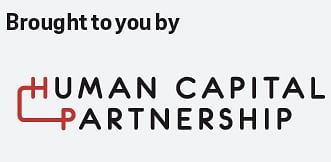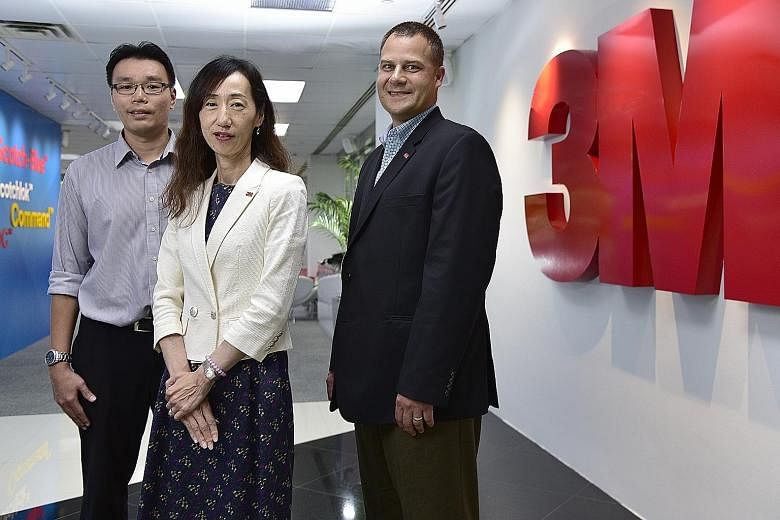No one remains in their comfort zone at 3M, a diversified conglomerate best known as the maker of Post-it notes, and a company that has built a reputation of innovation over time.
3M ensures "every talent move is a deliberate move", employees have several skills and encourages constant collaboration, among other things, noted 3M managing director Yuko Nakahira.
She said: "When the notion of staying in one's comfort zone kicks in, this in itself is self-limiting for the employees and also for the organisation. It impedes 3M from staying competitive and agile to adapt and transform."
Investing in human capital turned 3M into a "more nimble organisation to serve customers better". Take an example on the production floor, where employees are equipped with different skills needed to run multiple operations.
What this means is that when production demands fluctuate, employees can be easily moved to other areas, and that is also part of their development.
"In the longer term, they could grow into subject matter experts in certain processes and contribute in the technical area," she added.
-
THE PROGRAMME
The Human Capital Partnership (HCP) Programme is a tripartite initiative to grow a community of exemplary employers focused on staying competitive by investing in human capital development.
HCP recognises and supports employers committed to programmes that nurture a stronger Singaporean Core; maximises complementarity between locals and foreigners; and enhances skills transfer from foreign to local employees in order to increase the capabilities of the local workforce.
To find out more on how you can be part of the HCP Programme, contact Tafep (Tripartite Alliance for Fair and Progressive Employment Practices), the HCP programme manager at 6302-2782, e-mail us at hcpartner@tafep.sg or visit https://www.tafep.sg/human-capital-partnership-programme for more information.
-
In the spotlight
When the 3M Tuas plant was set up in 2010, Mr Mark Ratzlaff was transferred to Singapore from the United States to help start the new operations and train the local teams.
He mentored 3M Singapore's Mr Eugene Chew, who was then a production manager, and used his technical knowledge to train the local engineering and production teams.
Having learnt from Mr Ratzlaff about the operations, Mr Chew was able to take over his position when Mr Ratzlaff returned to the US, and Mr Chew became the new product manager for the display materials and systems division in 2012.
3M managing director Yuko Nakahira said: "True to the 3M strategy of developing globalised leaders, Mark has recently returned to Singapore to assume the role of South- east Asia regional manufacturing operations manager."
Mr Chew, who started his career in 3M as a flex process engineer in 2004, later paid it forward by developing Mr Peter Huang, who eventually became the process engineering manager for the display materials and systems division.
This has led to lower attrition rates and better employee retention.
The drive for multiple skills has also encouraged its foreign and local employees to learn from each other. Ms Nakahira said: "Foreign talent with extensive international experience and global networks are sometimes brought in to transfer skills and competencies not available locally."
She noted the transfer and exchange of local and foreign skills and talent is not one-way. And building global and diverse talent is one of the firm's strategies.
"Human capital development is an integral part of our business strategy, as we need the right talent with the right competencies to meet 3M's goals and objectives," said Ms Nakahira.
Research and development manufacturing engineers are exposed to different processes or product lines, and get to move up the technical or management ladder, for instance. The firm also sponsors studies, sends staff to external courses, and has its own programmes, such as what is called the Leaders-Teach-Leaders Concept, run by the management.
With such practices, employees become more committed and fully engaged, taking "pride in being a 3M-er". 3M has been in Singapore since 1966, starting with eight employees, and now has more than 1,600. There are also plans for 3M's workforce - some 90,000 employees in 70 countries - to be actively involved in development opportunities by 2025. The firm is part of the Human Capital Partnership Programme.
Of the programme, Ms Nakahira said: "We take pride in being part of the community to help shape the human capital plan for Singapore. We also wish to learn from the best practices from other peer companies. "This enhances our employment brand and would have a positive impact on our recruitment, engagement and retention efforts. It helps ensure that we have the right talent to keep 3M at the forefront of improving lives around the world through science."
Local talent also get to showcase and transfer their skills overseas, and this is in line with developing a stronger Singaporean core, a key aim of the Human Capital Partnership Programme.
"We have many Singaporeans in Singapore-based roles covering the Asia-Pacific region - they travel widely in the region, sharing their skills and expertise with our colleagues in other countries.
"We also have Singaporeans taking up overseas assignments, broadening their horizons and gaining more exposure. A great example is Mr Arthur Fong, former managing director of 3M Singapore, who recently relocated to China to lead the large 3M Industrial Business there," said Ms Nakahira.
As a science-based company and "an equal-opportunity employer", she noted that collaboration is crucial to the success of 3M's innovation engine.
"At 3M, we work in an engaging and collaborative environment where ideas are shared freely; where there is diversity, the freedom to explore and open communication. This is evident through the way we help our employees to develop and transfer skills."


